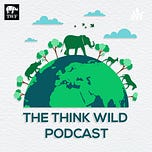In this insightful episode of the Think Wildlife Podcast, we are joined by Divya Karnad, one of India's leading marine conservationists and the co-founder of InSeason Fish, a pioneering initiative promoting sustainable fisheries and responsible seafood consumption across India’s coastal communities.
From India’s vibrant marine ecosystems to its threatened fisheries, this conversation dives deep into the ecological, social, and economic dimensions of marine biodiversity loss and ocean conservation. Divya Karnad draws from her extensive research and fieldwork with fishing communities to shed light on the nuanced challenges of natural resource management, the impact of bottom trawling on benthic habitats, and the broader implications of the climate crisis on marine wildlife.
The episode explores:
The founding philosophy of InSeason Fish and how it connects seafood consumers with small-scale sustainable fisheries.
Ecological damage caused by unsustainable fishing practices, including bottom trawling and bycatch.
The hidden role of government fisheries subsidies in perpetuating ecosystem degradation.
Practical conservation interventions led by fishers themselves: reducing net soak time, temporary fishery closures (like the Chennai “Reserve Bank” model), and gear modifications.
The integration of marine sustainability education into Indian school curricula and culinary institutes to promote biodiversity conservation among youth and chefs.
The role of the IUCN Shark Specialist Group, and Divya’s leadership in incorporating human dimensions into shark and ray conservation.
The listing of shark and ray species under India’s Wildlife Protection Act, and why that may not be enough without better regulation of marine fisheries.
Her reflections on working across stakeholders—from fishers to restaurants to policymakers—and how one seafood restaurant fully adopted her conservation model by hiring a fisher as their procurement lead.
India is home to over 160 species of sharks and rays, many of which face threats from overfishing, habitat destruction, and climate change. This episode provides both a sobering look at the state of Indian biodiversity and a hopeful roadmap for how marine ecology and biodiversity management can be reshaped through grassroots action and systemic change.
Whether you're a marine biologist, policy enthusiast, conservation student, or seafood lover, this episode offers valuable insights on how you can contribute to marine conservation in India—starting with your plate.
To learn more or find out which fish are in season, visit: www.inseasonfish.com
Don’t forget to like, comment, and subscribe for more conversations on conservation biology, climate change, and biodiversity protection.
#fisheries #sustainablefisheries #coastalconservation #oceanconservation #marineecology #marineconservation #marinebiodiversity #marinewildlife #conservationbiology #biodiversity #biodiversityconservation #biodiversitymanagement #climatechange #climatecrisis #naturalresourcemanagement #biodiversityprotection #Indianbiodiversity #marineconservationists #marinefisheries #fish #sustainability











